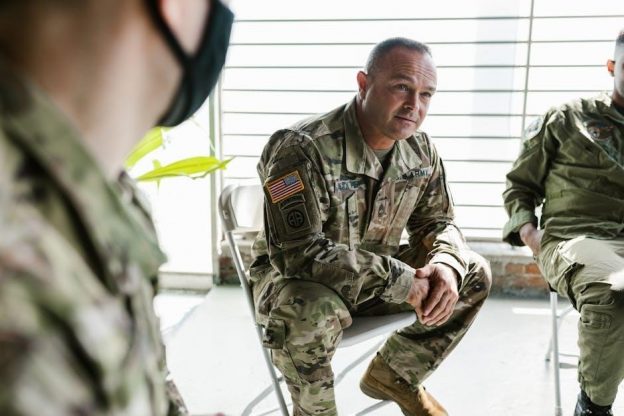Army initial counseling is a structured process to welcome and orient new personnel‚ outlining expectations‚ roles‚ and responsibilities. It ensures a smooth transition and sets clear goals.
1;1 Purpose and Expectations of Initial Counseling
The purpose of initial counseling is to welcome new personnel‚ outline expectations‚ and discuss roles and responsibilities. It establishes clear standards‚ unit norms‚ and performance goals‚ ensuring alignment with organizational objectives. This session sets the foundation for professional development‚ fostering a culture of accountability and mutual understanding; Expectations are communicated to guide behavior and performance‚ promoting a positive command climate.
1.2 Key Components of an Effective Initial Counseling Session
An effective initial counseling session requires clear communication‚ mutual respect‚ and a structured approach. Key components include establishing expectations‚ discussing roles and responsibilities‚ and setting measurable goals. Active listening and open dialogue foster trust‚ while documentation ensures accountability. Leaders should emphasize professionalism‚ military bearing‚ and adherence to standards. These elements ensure a productive and organized session‚ laying the groundwork for future success and a positive command climate.
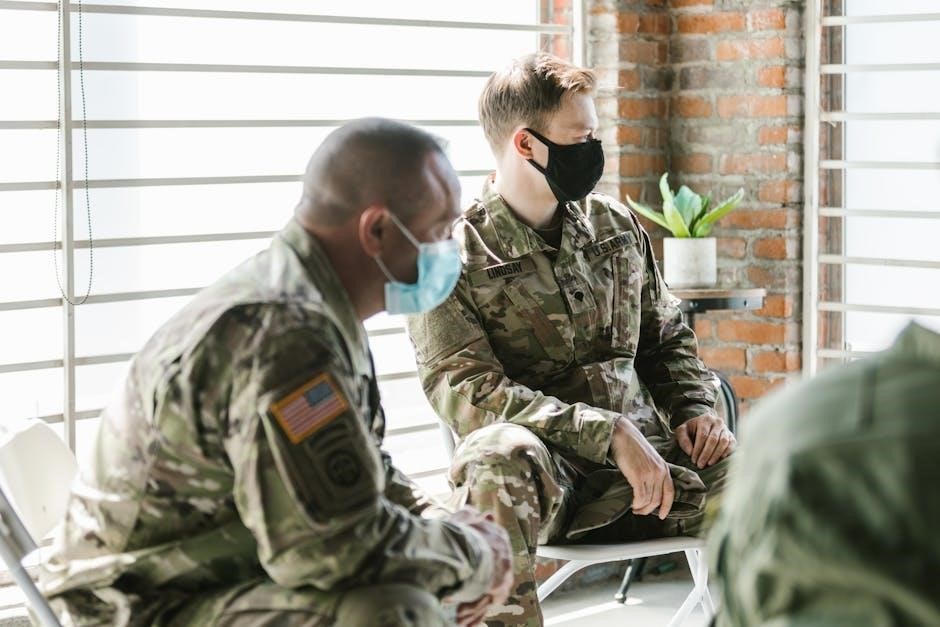
Importance of Initial Counseling in the Army
Initial counseling is crucial for building a positive command climate‚ aligning expectations‚ and fostering professional growth. It ensures Soldiers understand their roles and responsibilities‚ promoting accountability and cohesion.
2.1 Establishing a Positive Command Climate
Initial counseling fosters a positive command climate by promoting open communication‚ mutual respect‚ and shared goals. It helps leaders set clear expectations and demonstrate accountability‚ creating a culture of trust and professionalism. Effective counseling ensures Soldiers feel valued‚ understand their roles‚ and are motivated to contribute to unit success. This foundation strengthens team cohesion and mission readiness.
2.2 Setting the Tone for Professional Development
Initial counseling sets the foundation for professional growth by outlining clear expectations and developmental goals. It emphasizes accountability‚ continuous improvement‚ and the importance of aligning individual aspirations with unit objectives. This process ensures Soldiers understand their role in the organization and are equipped to achieve both personal and professional success‚ fostering a culture of growth and excellence.
Key Elements of Army Initial Counseling Examples
Key elements include clear communication of expectations‚ establishing accountability‚ and defining roles. These components ensure a structured approach to guiding Soldiers in their professional and personal development.
3.1 Communication and Military Bearing
Effective communication and military bearing are cornerstone elements of initial counseling. Leaders must demonstrate active listening‚ clarity‚ and professionalism while fostering an environment of mutual respect. Soldiers are expected to maintain proper posture‚ address superiors appropriately‚ and avoid informal language. These practices ensure discipline‚ accountability‚ and a professional command climate. Examples include proper saluting‚ addressing senior personnel‚ and adhering to dress code standards.
- Active listening and clear dialogue.
- Maintaining proper posture and uniform standards.
- Addressing superiors with respect and formality.
- Avoiding informal language or slang.
3.2 Discipline and Accountability
Discipline and accountability are emphasized during initial counseling to ensure adherence to Army standards. Soldiers are expected to meet physical fitness‚ uniform‚ and behavioral expectations. Leaders stress the consequences of failing to meet these standards‚ such as corrective training or formal disciplinary actions. Accountability extends to punctuality‚ duty performance‚ and maintaining professional conduct at all times.
- Adherence to AR 600-9 and other regulations.
- Consequences for failing to meet standards.
- Leadership’s role in enforcing accountability.
- Documentation of progress and violations.
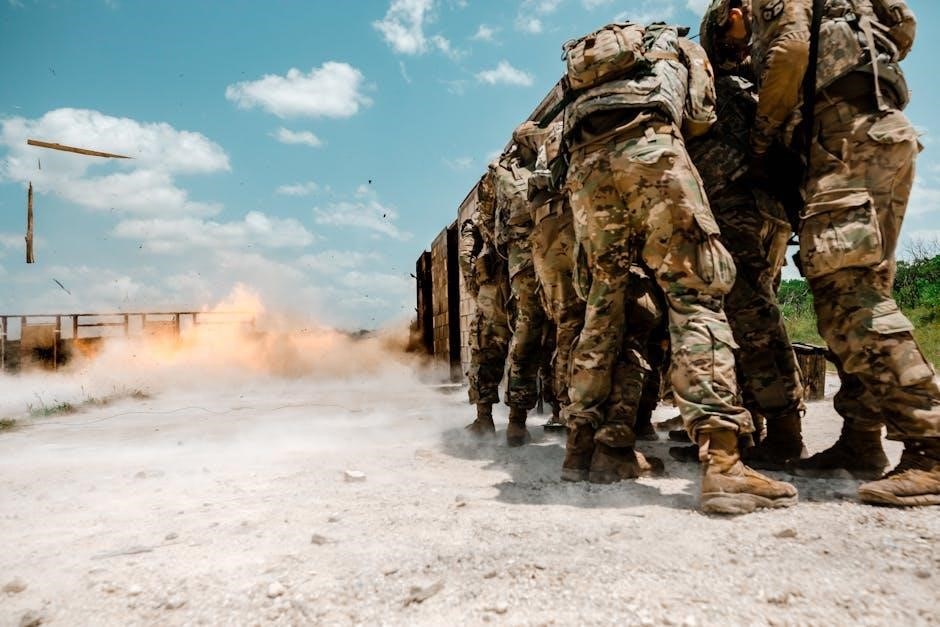
Common Examples of Initial Counseling Scenarios
Initial counseling scenarios often involve welcoming new personnel‚ addressing performance issues‚ and establishing expectations. Examples include officers setting command climates and enlisted leaders discussing responsibilities and accountability.
4.1 Initial Counseling for Officers
Initial counseling for officers focuses on setting clear expectations‚ professional development‚ and leadership roles. It emphasizes accountability‚ maintaining a positive command climate‚ and understanding responsibilities. Officers are expected to lead by example‚ fostering a culture of excellence and adherence to Army values. This counseling also covers required reading‚ unit policies‚ and performance goals to ensure alignment with organizational objectives.
4.2 Initial Counseling for Enlisted Personnel
Initial counseling for enlisted personnel focuses on discussing roles‚ responsibilities‚ and performance expectations. It covers Army regulations‚ such as AR 600-9‚ and emphasizes physical fitness standards. Soldiers are encouraged to communicate effectively‚ maintain discipline‚ and uphold military bearing. This session also outlines unit policies and provides guidance on meeting Army standards‚ ensuring a smooth transition into their new role.

Tools and Templates for Initial Counseling
Various tools and templates‚ such as Army initial counseling examples in PDF format‚ provide structured frameworks for leaders to document expectations and responsibilities effectively.
5.1 Army Initial Counseling Examples in PDF Format
Army initial counseling examples in PDF format provide structured templates for leaders to document expectations‚ responsibilities‚ and goals. These templates often include sections for duty descriptions‚ performance standards‚ and developmental plans‚ ensuring clarity and consistency. They are widely available online and serve as invaluable resources for both officers and enlisted personnel to guide effective counseling sessions.
5.2 Counseling Checklists and Forms
Counseling checklists and forms are essential tools for ensuring structured and effective counseling sessions. They provide a comprehensive outline of key areas to cover‚ such as duty expectations‚ performance standards‚ and developmental goals. These documents help leaders maintain consistency and thoroughness‚ ensuring all necessary topics are addressed. Additionally‚ they aid in documenting progress and maintaining accountability‚ aligning with legal and administrative requirements. They are widely used across the Army for their clarity and effectiveness in guiding meaningful discussions.
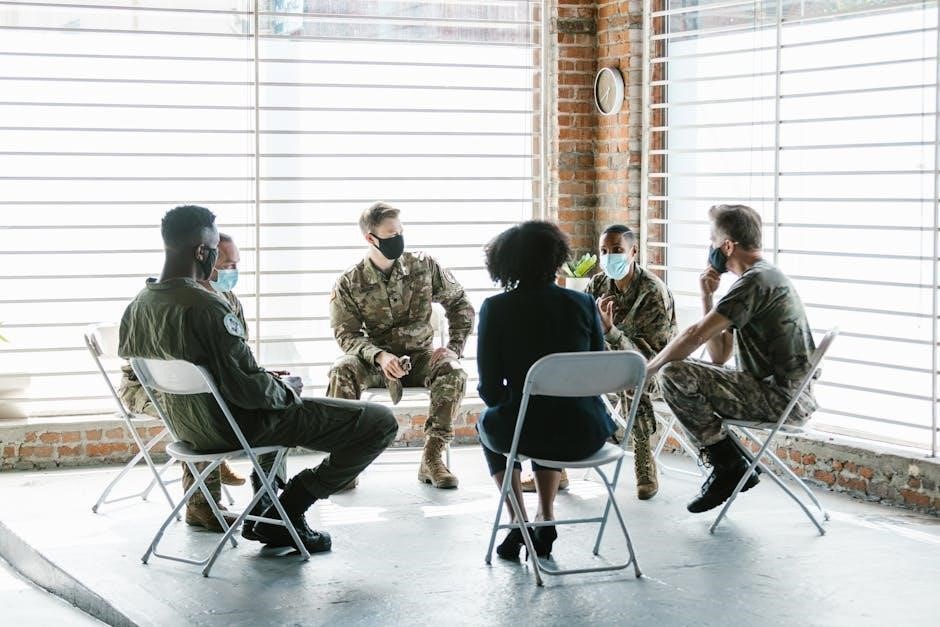
Best Practices for Conducting Initial Counseling
Leading by example and fostering a positive command climate are crucial. Active listening‚ clear communication‚ and setting measurable goals ensure effective counseling sessions and accountability.
6.1 Leading by Example
Leading by example is foundational to effective initial counseling. Demonstrating professionalism‚ accountability‚ and discipline sets the standard for subordinates. Leaders should foster a positive command climate by maintaining high ethical standards and practicing active listening. This approach builds trust and mutual respect‚ ensuring a strong foundation for professional development and unit cohesion. It emphasizes the importance of consistency in words and actions.
6.2 Goal Setting and Performance Expectations
Effective initial counseling involves setting clear‚ achievable goals and outlining performance expectations. Leaders should collaborate with subordinates to establish SMART goals‚ aligning personal and professional development with unit objectives. This process ensures clarity‚ accountability‚ and measurable progress. Regular feedback and resources are provided to support soldiers in meeting standards and achieving success‚ fostering a culture of continuous improvement and mission readiness.
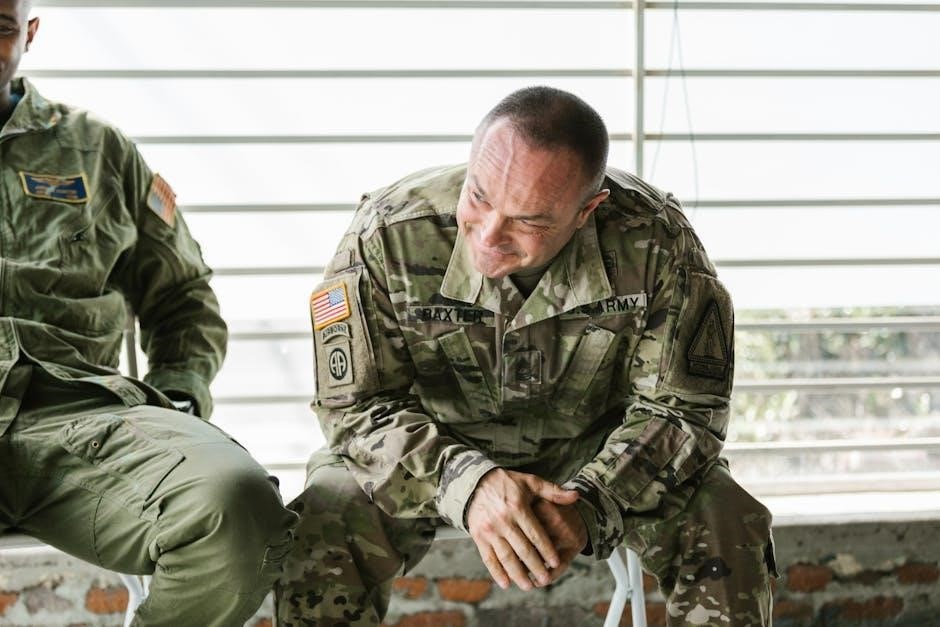
Legal and Administrative Considerations
Army initial counseling must adhere to legal and administrative standards‚ ensuring confidentiality and proper documentation. Leaders must follow Army regulations and use approved forms like DA Form 4856.
7.1 Army Regulations and Policies
Army initial counseling must comply with specific regulations‚ such as AR 600-9‚ which outlines standards for body composition and physical fitness. Leaders are required to document counseling sessions using official forms like DA Form 4856‚ ensuring transparency and accountability. Adherence to these policies helps maintain consistency and fairness across all ranks‚ fostering a disciplined and professional environment within the Army.
7.2 Confidentiality and Documentation
Confidentiality is crucial in Army initial counseling to build trust between leaders and subordinates. Documentation‚ such as DA Form 4856‚ ensures counseling sessions are recorded accurately. Proper storage of these records maintains privacy and provides a reference for future evaluations. Leaders must adhere to regulations to protect sensitive information while ensuring transparency in the counseling process.
Case Studies and Real-Life Scenarios
Real-life examples from Army initial counseling PDFs illustrate successful outcomes and challenges. These scenarios provide practical insights‚ helping leaders refine their approach and improve counseling effectiveness.
8.1 Successful Initial Counseling Outcomes
Successful initial counseling outcomes are achieved through clear communication and well-defined expectations. Leaders ensure Soldiers understand their roles‚ fostering trust and accountability. Examples from Army initial counseling PDFs demonstrate how effective sessions lead to improved performance‚ enhanced professional development‚ and a stronger command climate. These outcomes highlight the importance of structured counseling in achieving individual and unit goals effectively.
8.2 Lessons Learned from Counseling Sessions
Lessons learned from counseling sessions emphasize the importance of active listening and clear communication. Examples from Army initial counseling PDFs highlight how addressing challenges early fosters trust and accountability. Leaders learn to tailor approaches to individual needs‚ ensuring alignment with unit goals. These insights improve future counseling effectiveness‚ enhancing professional development and unit cohesion through structured‚ supportive interactions.
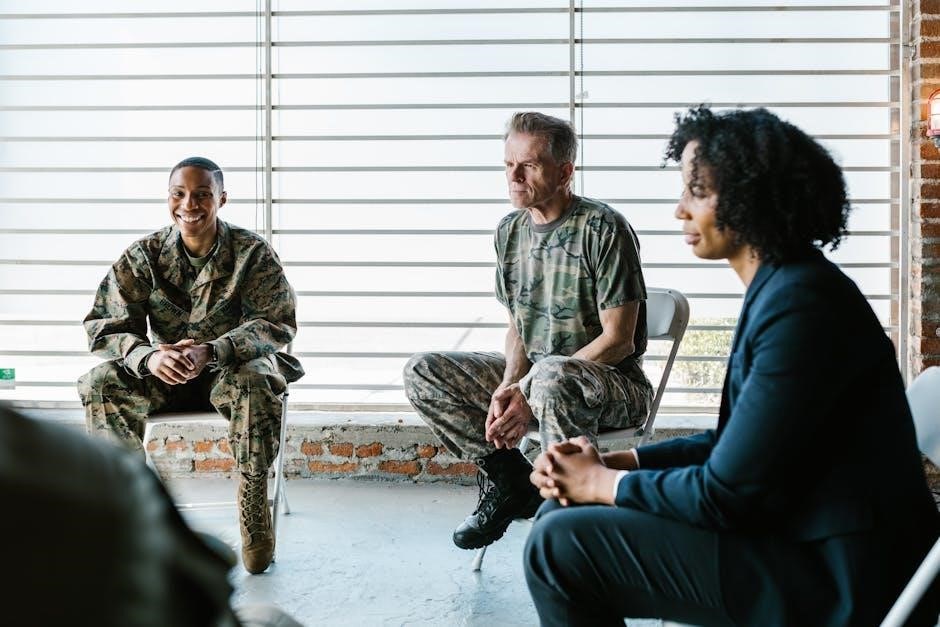
Preparing for Initial Counseling
Research and review Army initial counseling examples to understand expectations. Organize materials‚ identify key points‚ and prepare questions to ensure a productive session.
9.1 Research and Advance Preparation
Review Army initial counseling examples to understand expectations and standards. Soldiers should research regulations‚ familiarize themselves with forms‚ and prepare questions. Leaders must tailor counseling to individual roles‚ ensuring clarity on responsibilities and goals. Using checklists and templates can streamline preparation‚ fostering a structured and productive counseling environment for all parties involved.
9.2 Using Counseling Templates Effectively
Templates simplify the counseling process‚ ensuring consistency and thoroughness. They provide structured formats for discussing roles‚ expectations‚ and goals. Leaders can customize templates to address specific needs‚ saving time and reducing errors. Effective use of templates enhances clarity‚ organizes key points‚ and ensures all critical areas are covered‚ fostering productive and focused counseling sessions for both leaders and subordinates.
Effective initial counseling sets the foundation for a successful military career. Utilize resources like templates and checklists to ensure consistency and clarity. Leaders should continuously refine their approach‚ fostering growth and maintaining professional relationships to support long-term development and mission readiness.
10.1 Follow-Up and Continuous Improvement
Regular follow-up sessions are essential to monitor progress and provide feedback. Leaders should maintain open communication and use counseling checklists to ensure consistency. Continuous improvement involves updating methods based on subordinate feedback and Army regulations‚ ensuring alignment with professional development goals. Documenting outcomes and reflecting on counseling effectiveness helps refine strategies for future sessions and enhances overall performance.
10.2 Maintaining a Professional Relationship
Maintaining a professional relationship involves setting clear expectations‚ fostering open communication‚ and demonstrating respect. Leaders should serve as role models‚ adhering to Army values and ethical standards. Transparency and consistency in interactions help build trust‚ while regular feedback ensures alignment with professional goals. This foundation supports a productive and respectful working environment‚ essential for mission success and team cohesion.
